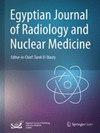Diffusion kurtosis imaging for different brain masses characterization
IF 0.5
Q4 RADIOLOGY, NUCLEAR MEDICINE & MEDICAL IMAGING
Egyptian Journal of Radiology and Nuclear Medicine
Pub Date : 2024-07-30
DOI:10.1186/s43055-024-01315-x
引用次数: 0
Abstract
Diffusion kurtosis imaging is an advanced magnetic resonance imaging technique that reveals additional information on the microstructure and micro-dynamics of different brain masses without the need for contrast agents. The aim of this study was to provide a comprehensive analysis of the role of MRI diffusion kurtosis and to compare it with magnetic resonance spectroscopy (MRS) and dynamic susceptibility contrast perfusion (DSC) in characterizing different brain masses, including gliomas, recurrent tumors, radiation necrosis, abscesses, and infarctions. Sixty-six patients with intracranial brain masses were enrolled in this prospective study. All patients were examined by conventional MRI sequences, DSC perfusion, MRS, and diffusion kurtosis imaging, with implemented b values which were 200, 500, 1000, 1500 and 2000s/mm2. Mean kurtosis (MK) was higher (P < 0.001) in recurrent brain tumors than in radiation-induced necrosis; the optimal MK cutoff value for differentiation between them was 642 with 91.3% sensitivity and 85.7% specificity. Mean kurtosis was also higher (P < 0.001) in high-grade gliomas than in low-grade gliomas; the optimal MK cutoff value for differentiation between them was 639 with 91.6% sensitivity and 85.71% specificity. There was a good level of agreement between ADC and MD within the studied cases, with a correlation coefficient r = 0.815. MK had more sensitivity and specificity in differentiation between high- and low-grade gliomas, as well as RIN and tumoral recurrence, than MRS and DSC. Diffusion kurtosis imaging stands as an integral, noninvasive, and noncontrast tool for the characterization of various brain masses. It augments the capabilities of traditional and advanced MRI techniques, providing a deeper understanding of the microstructural changes in brain tissues.不同脑部肿块特征的扩散峰度成像
弥散峰度成像是一种先进的磁共振成像技术,无需造影剂即可揭示不同脑部肿块的微观结构和微观动力学的额外信息。本研究旨在全面分析核磁共振弥散峰度成像的作用,并将其与磁共振波谱成像(MRS)和动态感性对比灌注成像(DSC)进行比较,以确定不同脑肿块(包括胶质瘤、复发性肿瘤、放射性坏死、脓肿和脑梗塞)的特征。这项前瞻性研究共纳入了66名颅内脑肿块患者。所有患者均接受了常规磁共振成像序列、DSC灌注、磁共振成像和弥散峰度成像检查,b值分别为200、500、1000、1500和2000s/mm2。复发性脑肿瘤的平均峰度(MK)高于放射性坏死(P < 0.001);区分两者的最佳 MK 临界值为 642,灵敏度为 91.3%,特异度为 85.7%。高级别胶质瘤的平均峰度也高于低级别胶质瘤(P < 0.001);区分它们的最佳 MK 临界值为 639,灵敏度为 91.6%,特异度为 85.71%。在所研究的病例中,ADC 和 MD 之间的一致性很好,相关系数 r = 0.815。与 MRS 和 DSC 相比,MK 在区分高级别和低级别胶质瘤以及 RIN 和肿瘤复发方面具有更高的灵敏度和特异性。弥散峰度成像是表征各种脑肿块的一种完整、无创、非对比的工具。它增强了传统和先进核磁共振成像技术的能力,让人们更深入地了解脑组织的微观结构变化。
本文章由计算机程序翻译,如有差异,请以英文原文为准。
求助全文
约1分钟内获得全文
求助全文
来源期刊

Egyptian Journal of Radiology and Nuclear Medicine
Medicine-Radiology, Nuclear Medicine and Imaging
CiteScore
1.70
自引率
10.00%
发文量
233
审稿时长
27 weeks
 求助内容:
求助内容: 应助结果提醒方式:
应助结果提醒方式:


